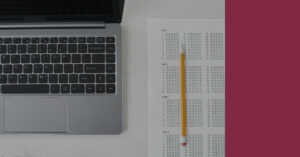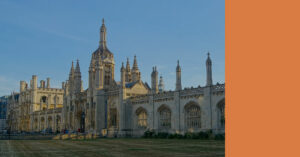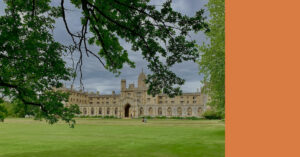Welcome to our UK Medical School Review series. In this series, we work with current students to produce an in-depth overview of each UK Medical School, covering what it is like to study there, how the course looks and what you need to get in.
Today, we are focussing on Warwick Medical School, a member of the Russell Group of UK research-intensive universities, boasting the largest graduate-only medical course in the UK. Laura, a Warwick Medic, will share her experiences and insights as a current student throughout.
Overview Of Warwick Medical School
About Warwick Medical School
Warwick Medical School was opened in 2000 in collaboration with Leicester Medical School, with the first students graduating in 2004. Warwick eventually received independent degree-awarding status in 2007; graduates this year the first to receive University of Warwick medical degrees. The Medical School comprises of the Institute of Clinical Education, the Health Sciences Research Institute and the Clinical Sciences Research Institute. A Surgical Training Centre was opened in 2009.
Warwick Medical School solely offers a 4-year Graduate-entry Medicine programme, which is now the largest Graduate medical course in the UK. Completion of the programme results in the award of a Bachelor of Medicine and Surgery (MBChB) degree. There are no Dentistry courses offered at the University of Warwick.
Warwick Medical School
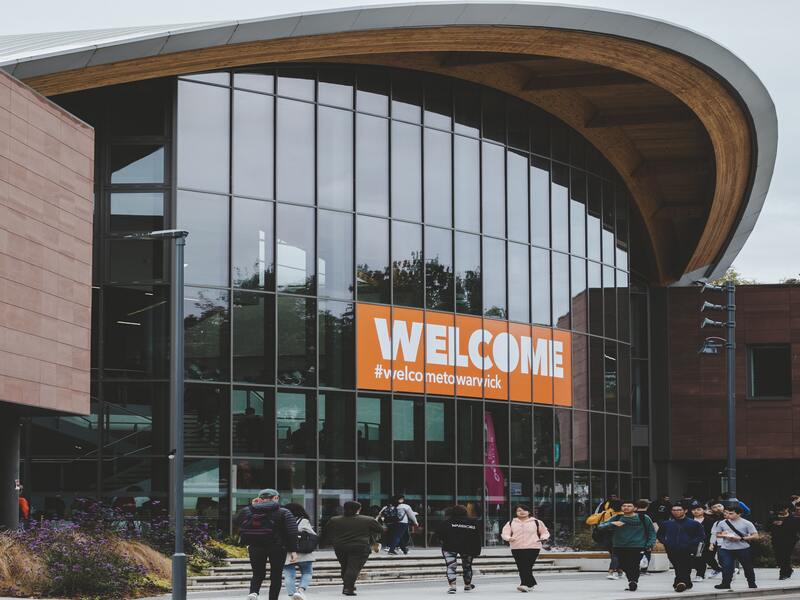
- University Age: 57
- UK Ranking: 33rd
- Pint Price: £4
- Alumni Notability: 10/10
- A-level Requirements: N/A
- Places Available: 193
- Applicant Success Rate: 14%
- Teaching Style: CBL
- Interview Style: MMI
- Admissions Test: UCAT
Why did you choose to study at Warwick?
“As a Graduate, there are only a limited number of 4-year courses to consider, especially without sitting the GAMSAT admission test. As I applied for Medicine during the final year of my Undergraduate course, I chose to sit the UCAT instead as it is a shorter exam and in my opinion was easier to revise for. This narrowed my options further and with Warwick having such a large graduate-only course, being situated in the centre of the country and a prestigious University it was a no-brainer for me!”
What is the best thing and worst thing about your Medical School?
“I think the best thing about the course is the number of Graduates- this means you have all had the Undergraduate experience and can relate to many people on the course in lots of ways. You don’t have to join the 2nd year of a 5-year course where other students have already had the opportunity to get to know each other and been in the University for a year, instead everyone is in a similar boat. On the other hand, because everyone has some experience the course does have a large element of independent study and doesn’t hold your hand every step of the way which means you have to be self-motivated and often seek out learning opportunities which can be challenging on busy wards in the NHS!”
Medical School Rankings
The following link will take you to the Complete University Guide Medicine League Table. University of Warwick Medical School takes 33rd position with an overall score of 95%:
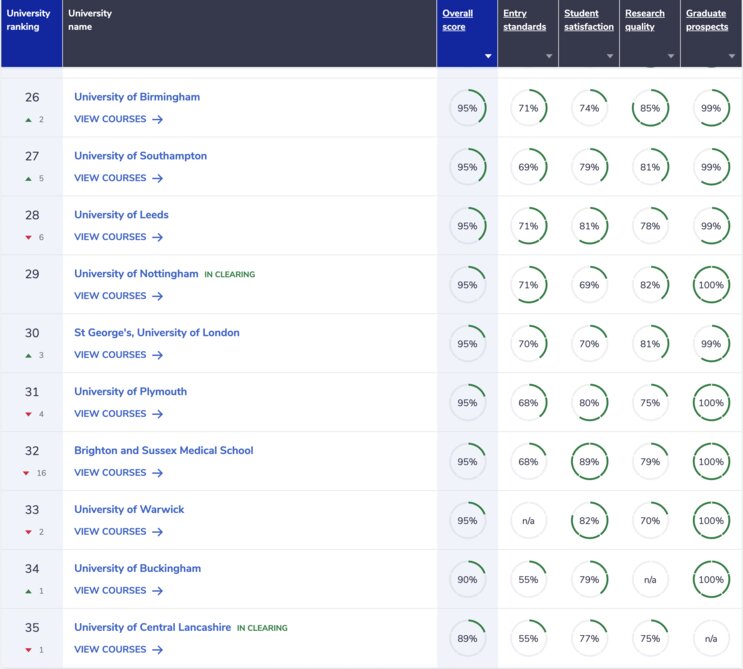
The table also highlights 100% graduate prospects for Warwick Medics so there’s little to worry about once you graduate!
Rankings will, of course, differ between other tables; the Guardian includes different aspects to the Complete University Guide. When making your own decision on which table to look at, think about what you place more importance on, such as spending per student or career prospects. Keep in mind that all Medical Schools are highly ranked with excellent ratings across the board.
Warwick Medical School Fees And Financial Support
The yearly tuition fees for the Graduate course in Medicine at the University of Warwick are 9,250 for home students. For international students, annual fees are £25,997 for Year 1 and £45,326 for Years 2-4. Tuition fee loans are offered to all UK students by the Government and cover the course fees in full. Fees do not have to be paid up front. Whether you are a home or international student, Warwick offers multiple bursaries and funds to help with costs, and the Student Funding Office are a useful contact for advice and support.
What are the living costs like?
“Living costs are quite reasonable, the National Express buses cap at £4 per day or £12 per week meaning you can use them as often as needed within those time frames for that price, there are also yearly and monthly passes available if you’re using it more frequently. A lot of students have their own cars which is an advantage as placements can be challenging/near impossible to access via train or bus (particularly rural General Practices from 2nd year) although pairing up with another student with a car is an option if you don’t have access to a vehicle. Most students opt for shared houses rather than University accommodation and this varies depending on the area with Leamington being slightly more expensive than Coventry and the surrounding areas, but you can find flats and shared houses for approximately £400 per month relatively easily.”
Not sure where to start with your Medical School application?
Our Complete Bundle provides support for your Personal Statement, UCAT, BMAT and Interview and guides you to a successful application.
With our Complete Bundle, we guarantee that you will get at least one offer to study Medicine, or your money back.
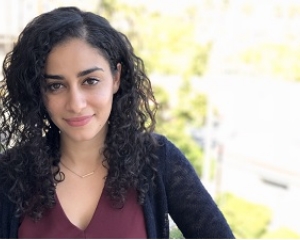

What Is Studying At Warwick Medical School Like?
Case-based learning is the core of teaching at Warwick Medical School and is integrated across all 4 years. Students will learn about particular topics in lectures and self-directed study before working in a group on a related case.
This allows students to be proactive in their learning and enhance their skills of communication and discussion. Teaching also takes the form of experiential learning, clinical skills and e-learning. Anatomy is taught via prosection with collections from Gunther von Hagens’ Plastinarium in Germany.
The majority of Year 1 teaching is University-based, focussing on theory with occasional clinical exposure. This gradually increases in Year 2 until students enter full-time clinical placement for Years 3 and 4. Placements typically take place within primary and secondary care settings in Coventry and Warwickshire, Birmingham, Worcestershire and Northamptonshire.
What is a week in first year like at Warwick Medical School?
“A typical week in first year will start with on Monday with CBL and lectures; Tuesday either asynchronous learning or teaching in community, Wednesday face-to-face procedural skills and Thursday and Friday a combination of CBL, asynchronous learning and groupwork depending on group allocations. In Years 2-4 this becomes much more focused on placement, with varying length blocks and teaching usually every other Friday featuring CBL, lectures and group activities. Clinical skills teaching occurs in trust.”
Below is an example first year timetable from Warwick Medical School:
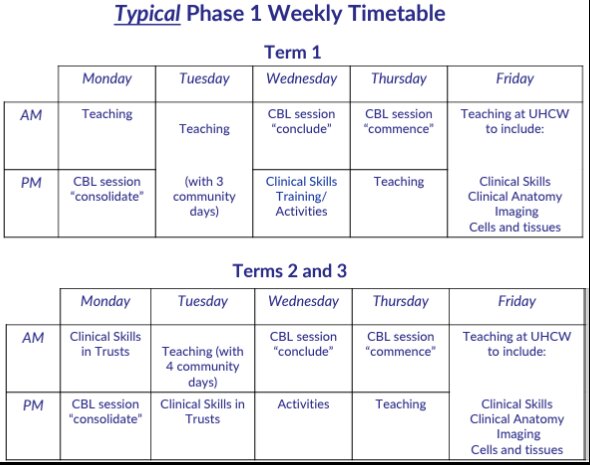
Warwick Medical School Degree Content
Warwick offers just one Medicine course, a four-year Graduate Entry course.
Graduate Medicine Course (4-years)
Modules taught in the curriculum at Warwick Medical School are partially system-based and what you learn in prior years will be added upon later. Throughout the programme, students are also taught and encouraged to focus on developing the core values expected of a Warwick Doctor as outlined by the General Medical Council.
In Years 2 and 3, students have the opportunity to undertake a Student Selected Component (SCC), choosing topics that interest them from a range of options that have broad relevance to the curriculum, allowing students to further explore areas of interest. Examples of SCCs include: Counselling Skills, Clinical Ethics and Law, Infectious Diseases and Tropical Medicine, The Digital Doctor and Brain Injury from Roadside to Rehabilitation and Beyond.
Year 4 involves a 6-week Elective in which students have the opportunity to conduct a project in an area of their choice, either at Warwick or elsewhere in the UK or abroad. This will help students gain more experience and enhance their interests.
Level 4 starts out with a transition block to help students learn how to get the most out of your ward-based learning. This lasts the first 8 weeks.
To help prepare students for entering their Foundation Years as a Doctor, an Assistantship is also undertaken in Final Year to provide further hands-on learning and practice.
Below is a summary of the curriculum across the 4 years:
Summary of the curriculum:
Year 1:
- Term 1
- Welcome Week
- Health Metabolism and Homeostasis
- Blood, Lungs and Heart
- Term 2
- Brain and Behaviour
- Locomotion
- Term 3
- Reproduction and Child Health
Year 2:
- Advanced Cases 1
- Expand on areas from Year 1
- Consider multisystem disease and links between primary and secondary care
- Develop skills in critical analysis, teamworking and communication
- History taking and examination
- Core Clinical Education
- Placements in:
- Medicine
- Surgery (including Orthopaedics) and Anaesthetics
- General Practice
- Obstetrics and Gynaecology
- Child Health
- Psychiatry
- SSC
- Placements in:
Year 3:
- Advanced Cases 2
- Expand on areas from Years 1 and 2
- Advanced clinical cases
- Focused plenary lectures
- Clinical learning in hospital or community settings
- Develop understanding of inter-professional learning
- 6 Specialist Clinical Placements in any of:
- Care of the Medical Patient
- Care of the Surgical Patient
- Acute Medicine
- Psychiatry
- Child Health
- Musculoskeletal Healthcare
- Obstetrics and Gynaecology
- General Practice
- SSC
Year 4
- Advanced Clinical Cases
- Common and important clinical cases covered in clinical settings to consolidate knowledge from previous years
- Practice clinical skills
- Address individual learning needs
- Remaining 2 Specialist Clinical Placements in those not covered in Year 3:
- Care of the Medical Patient
- Care of the Surgical Patient
- Acute Medicine
- Psychiatry
- Child Health
- Musculoskeletal Healthcare
- Obstetrics and Gynaecology
- General Practice
- Elective
- Assistantship
The course outline by Warwick University:

What Makes Warwick Medical School Unique?
What makes your Medical School unique?
“Warwick has a large intake of purely Graduate-entry Medical Students, accepting a wide range of degrees, including non-science Graduates. This makes for a great mix of ages, backgrounds, and experience on the course and therefore, you are likely to meet people like you as well as learn lots from fellow coursemates. The teaching facilities are brilliant, with the first year focusing on the basics of anatomy, physiology, clinical skills and pharmacology. The Medical School uses plastinated specimens as an alternative to dissection in weekly sessions, which most find extremely useful to visualise structures in the body with the help of the experienced teaching team. Another good thing about the University is the access to the teaching hospitals in the area with the largest being University Hospital Coventry and Warwickshire (UHCW). UHCW is one of the largest teaching hospitals in the country, which serves a population of over a million people along with Rugby St. Cross. This provides lots of great learning opportunities to students and the chance to see a variety of specialities.”
Candidate Selection
Stage 1: applicants pre-screened against academic and work experience criteria.
Stage 2: applicants with a verbal reasoning score below the national mean are rejected.
Stage 3: UCAT total score is combined with a score for academic achievement and work experience. Scores are ranked.
Stage 4: candidates who score above the cut-off are invited for interview.
Stage 5: scores from the interview are compiled, and offers made.
Warwick Medical School Entry Requirements
| Exam | Graduate Entry Medicine |
|---|---|
| Degree | An upper second-class honours in any subject. Candidates with a lower second-class degree should hold either a Master’s or a Doctoral qualification. |
| A-Levels and GCSES | Not considered. |
Medical School application causing you confusion?
Our Complete Bundle provides support for your Personal Statement, UCAT, BMAT and Interview and guides you to a successful application.
With our Complete Bundle, we guarantee that you will get at least one offer to study Medicine, or your money back.


Warwick Medical School Personal Statement
The personal statement does not form a central part of Warwick Medical School’s selection process.
Warwick Medical School does, however, expect applicants to have a minimum of 70 hours of work experience across the last 4 years in a healthcare setting, and you will be required to complete a separate online survey providing information surrounding at least 2 different experiences.
Warwick specifies that the work experience must include experience of a healthcare environment and direct hands-on care of people to meet their healthcare needs, excluding friends and family. No 1 experience can make up over 50 hours of the required 70. Shadowing is an acceptable experience however can only count for 20 hours.
Other acceptable types of experience include voluntary work in a nursing home, care home, hospice or hospital as well as employment in professional healthcare roles and official community-based healthcare, such as nurse, physiotherapist, paramedic, physician associate and healthcare assistant.
Ideally, Warwick are looking to see that your work experience shows you have experience of providing hands-on care, have discovered what it is to be a member of a medical profession, have experience of a teamwork in providing care and have experience of a healthcare environment, ideally that of today’s NHS.
Be honest and candid as it is likely you will be asked to expand and reflect on your work experience in the interview!
When it comes to personal statement writing, 6med’s Personal Statement Bundle is your best bet for creating the perfect statement!
Warwick Medical School Admissions Tests
UCAT Requirements
You need to undertake the University Clinical Aptitude Test (UCAT) in order to apply to the University of Warwick. Initially, Warwick focus on applicants’ score in the verbal reasoning section as they believe this is a good predictor of success in certain Medical School examinations. Those with a verbal reasoning score below the national mean for the cohort will be rejected. Those at or higher than the mean will have points awarded to a total UCAT score, with those scoring highest receiving the most points. The threshold score to then secure an interview with Warwick Medical School varies each year depending on the performance of that year’s cohort and as such it is not possible to give an exact indication.
However, for reference, the lowest UCAT score that secured an interview for 2022 entry was 2,660. Check out our UCAT Scoring Guide to learn more!
The BMAT or GAMSAT is not required.
Warwick Medical School Interview
Interviews at Warwick Medical School typically take place in early December. Approximately 450 candidates are interviewed each year.
MMI Interview Style
The interview at Warwick takes the form of Multiple Mini Interviews (MMIs). There are 6 stations, with the whole process lasting around 2 hours.
Values and competencies Warwick are looking for, and as such may base their stations around, include teamworking, insight, resilience, communication, empathy, probity, respect and dignity.
Warwick recommend reflecting on your work experiences and these core values in preparation for the interview.
If you’re feeling unsure about your interview skills, you can sign up for 6med’s Interview Bundle to learn everything you need to know to ace your interviews!
Example Warwick Medical School Interview Questions:
- Reflect on a time when you had to tailor your communication style to meet your audience’s needs. (2018)
- Why is confidentiality important? (2019)
- What does integrity mean to you? Discuss a time where you showed honesty and integrity. (2021)
- During your work experience, what skills did you notice doctors use to build rapport with their patients? (2020)
- What are the most pressing issues for the NHS today? (2020)
- Why have you decided that now is the time to train for a medical degree? (2019)
- Medicine is a popular career. What do you think will be the most rewarding aspects of being a doctor for you personally? (2021)
- Medicine can be hard at times. What do you think will be the most challenging aspects of being a doctor for you personally?(2019)
- As you know, medical training involves a lot of learning. People have different ways of learning. What techniques do you know of? (2021)
- Tell me about a time when you have had to adjust your language and behaviour to help someone understand. What did you adjust and what was the outcome? (2021)
Extra-Curriculars at Warwick Medical School
Outside of study time, what do most people get up to?
“MedSoc have a great range groups from speciality-themed societies like GPSoc to sports clubs like Medics netball, so it has something for everyone. MedSoc also host various social events throughout the years including balls, themed nights and daytime activities depending on the committee that year and interest of students. This is a great way to meet people and socialise with your year group as well as students in the years above and below. You also can join University societies not specifically for Medical Students, although making regular training times/commitments may be harder as you continue through the course due to the structure of the timetable and location of placement, but it is a good way to meet people outside of the course if you’re looking to get away from coursemates!”

What is the Warwick accommodation like?
“Not many Medical Students at Warwick stay within University accommodation but the most popular hall for this group is probably Tocil. This costs £114 per week and is within the main campus and close to the Medical School. It is self-catered but does have shared bathrooms and single rooms so isn’t super popular for this reason. Students often opt to live in private shared housing in Earlsdon and Leamington Spa or off-campus houses organised by the University (advertised on their website) where it is easy to arrange living with other Graduate-entry or post-grad students.”
Warwick Medical School Contact
Email: [email protected]
Tel: +44 (0)24 7652 4585
Postal address:
Warwick Medical School,
University of Warwick,
Coventry,
CV4 7AL,
United Kingdom
Advice for prospective warwick medical school students
What advice would you give to a first-year student starting at Warwick Medical School?
“Enjoy your time off before starting the course and make the most of the first year summer- this is the last long summer you get on the course and there are lots of fun things you can do! Make the most of opportunities that interest you, for example, research internships, summer school activities and other non-medical things, like sporting events, while you can. Try and plan how you will fund the course in advance and how much you need to save to pay the tuition not covered by student finance alongside living costs. Not everyone will have access to full NHS bursaries and student finance so it is useful to learn about this before starting so you can weigh up how much to save, whether to get a part-time job and whether you might be eligible for other funds, like hardship grants. Lastly, have confidence in yourself, it’s a hard course but if you’ve been offered a space it shows you’ve got what it takes to do well and the University and your coursemates are there to support you along the way!”
Check out our other UK Medical School Reviews:
Warwick Medical School is an exceptional place to study, and we’ll help you get there.
The 6med Complete Bundle puts all of our bundles together. You’ll get a place on five of our Crash Courses, Personal Statement re-drafts, mock interviews, Personal Statement, BMAT, UCAT and Interview Online Courses, access to BMAT & UCAT.Ninja™, BMAT essay marking and all of our critically acclaimed workbooks as e-books. To find out more, click the button below. This massive bundle is quite literally all you need for your Medicine application…
Not sure where to start with your Medical School application?
Our Complete Bundle provides support for your Personal Statement, UCAT, BMAT and Interview and guides you to a successful application.
With our Complete Bundle, we guarantee that you will get at least one offer to study Medicine, or your money back.
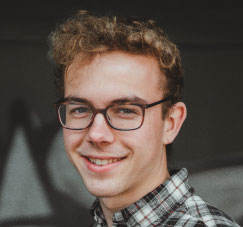

By Phoebe Baker


















